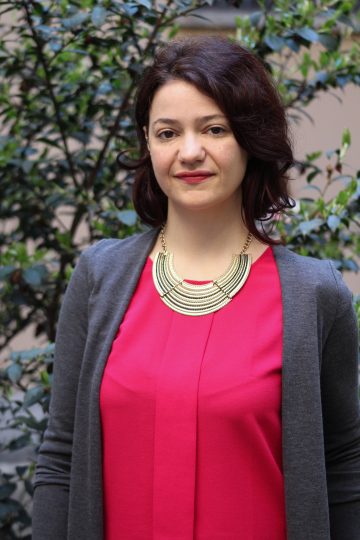Italy and Russia: what changes is the narrative

Eleonora Tafuro Ambrosetti,
PhD., Research Fellow,
Russia, Caucasus and Central Asia Centre, Institute for International Political Studies (ISPI),
Milan, Italy
Since Prime Minister Mario Draghi came to power, Italy – traditionally described as a country friendly to Russia – is seen as ‘returning to West’s fold’, distancing from Moscow and Beijing. However, despite Draghi’s renewed commitment to the Euro-Atlantic alliance, the substance of Italy-Russia relations remains unchanged. Italy’s view of Russia remains influenced by energy, economic links and the belief that dialogue with Russia is necessary to tackle important global crises.
Ahead of his 2019 visit to Rome, Vladimir Putin opened an interview to the Italian daily Corriere della Sera claiming that Russia and Italy have a “special relationship” that has “stood the test of time”. This is also the prevailing narrative most Russian and Italian institutions, companies, and even ordinary citizens put forward. Over the centuries, the Russian Empire, the Soviet Union and later the Russian Federation have enjoyed close cultural, economic and political ties with Rome. But while ideology and culture matter, economics has provided the constant bridge in relations.
Russia and Italy have been enjoying close economic ties, although the international conjuncture considerably limited them. In 2013, before the EU sanctions, the total trade exchange between the countries was 31 billion euros, while in 2019 (before COVID-19) it was down to 22 billion – still far better than the roughly eight billion in 2016 resulting from the sanctions and the economic crisis facing Moscow and consequent reduction in Russians’ purchasing power. While Russia keeps being Italy’s first source of gas and a major source for oil, Italian exports to the country – based on the ‘3 Fs model’, that is, food, furniture and fashion – suffered greatly. The agri-food sector, for instance, is the only sector still directly affected by Russia’s countersanctions, which led to the ban of exports to Russia of blacklisted agri-food products from Parmigiano Reggiano to Parma ham, but also fruit, fish and vegetables. Made in Italy agri-food exports to Russia have lost over 1.3 billion over six and a half years, according to the Italian National Confederation of Independent Farmers (Coldiretti). These affected groups are at the forefront of organisations lobbying for the end of the sanctions regime. Russia’s economic importance to Italy’s production and export compartments varies significantly according to the geography; the bulk of businesses and organisations lobbying for scrapping sanctions are located in the North-East, especially Lombardy and Veneto. Both regions’ presidents have criticised sanctions on various occasions. In 2016, the ruling coalition in Veneto approved a resolution aiming to “promote the establishment of a committee against sanctions against Russia, for the recognition of Crimea’s self-determination right, and the defence of Venetian products”.
Security is more and more relevant in the Italy-Russia dialogue. Russia’s increasingly prominent role in the MENA region increased Moscow’s general status in the region; through a show of military might and a savvy defence diplomacy campaign, Russia gained the image of an essential mediator. Libya is probably the regional crisis where Italy has a bigger stake in light of its colonial past and, especially, current energy and migration interests. In an open recognition of Russia’s role in the Libyan crisis, Rome has tried to involve Moscow in its diplomatic initiatives, chiefly the Palermo conference held on 12 and 13 November 2018, despite the countries backing opposite sides. Last August, Draghi and Foreign Minister Luigi Di Maio had talks with Russian Foreign Minister Sergey Lavrov. De Maio said that Rome was “counting on Moscow” to resolve the crisis in Afghanistan, adding that Moscow is a “fundamental actor” on the global scene.
When it comes to projecting soft power in Italy, Russia’s follows two main directions: on the one hand, anti-Americanism and anti-globalisation; on the other hand, conservative and religious values. In Italy and other European countries such as Germany or France, anti-American attitudes are relatively widespread and deeply rooted in some social groups, such as Italy’s radical left. Russia’s conservative narratives, in turn, attract far-right conservative parties across Europe. Russia frames itself as a key member of the “istinnaya Yevropa” (true Europe) based on a common Christian identity. This narrative is also propagated by politicians such as Matteo Salvini, who previously adopted an outrightly critical stance towards Brussels.
Hence, while political preferences and concrete stakes in the relationship with Moscow determine different depictions of Russia, the relationship’s long-standing importance and the necessity of dialogues are recognised across the board – and this is unlikely to change anytime soon. Dialogue and state visits kept happening even when EU-Russia hostilities reached their zenith. Last June, Draghi backed a controversial Franco-German proposal to hold an EU summit with Russia, adding that it was necessary to maintain dialogue with such significant economic power. Over the last ten years or so, Italy has had seven governments. Indeed, all of them have been trying to act as a bridge with Russia, putting forward an image of ‘mediators’, which is the footprint of Italian foreign policy but is, historically, even more critical in the relationship with Moscow.
Expert article 3072
> Back to Baltic Rim Economies 4/2021
To receive the Baltic Rim Economies review free of charge, you may register to the mailing list.
The review is published 4-6 times a year.
